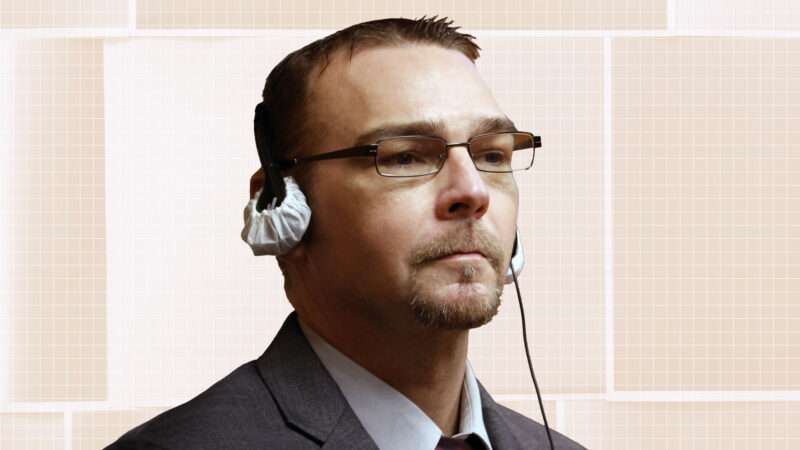
A jury on Thursday convicted a Michigan man of four counts of involuntary manslaughter for failing to stop his son from killing four of his peers in November 2021, putting an end to a closely watched prosecution that broke new ground in its attempt to punish the parents of a child who committed a school shooting.
James Crumbley faces up to 60 years in prison, as does his wife, Jennifer Crumbley, who was found guilty of the same charges last month. Prosecutors posited the two bore responsibility for allegedly ignoring signs that their son, Ethan Crumbley, was depressed, and for gifting him the gun he ultimately used to execute Madisyn Baldwin, Tate Myre, Justin Shilling, and Hana St. Juliana at Oxford High School.
It may be hard to find sympathy for the Crumbleys, who have, unsurprisingly, been a magnet for backlash. It's plausible they were negligent parents. But it can simultaneously be true that punishing them criminally for that sets a very troubling precedent, no matter how much you dislike them.
The prosecution's argument hinged on a few key points: Ethan Crumbley had mental health issues, which the government said his parents did not do enough to address—a point they emphasized more during Jennifer Crumbley's proceeding. During James Crumbley's trial, the government zeroed in on the gun he purchased for his son as an early Christmas present: He was allegedly careless, prosecutors said, with how he stored the weapon, creating a perfect storm that cleared the way for Ethan to carry out that shooting about two and a half years ago.
But, no matter how ruinous their parenting, the case against the Crumbleys in some sense hinged on what the government wanted the law to say—not on what it actually said. As I wrote last month:
Despite the fraught subject matter, and the absolute tragedy of those deaths, Michigan law still appeared inept to apply to the Crumbley parents. Michigan lawmakers have had the opportunity to pass "child access prevention" legislation authorizing criminal charges against adults "who intentionally or carelessly give minors unsupervised access to guns," noted Reason's Jacob Sullum in 2021, but they have on multiple occasions rejected the idea. And while the state has since enacted a "secure storage" law pertaining to safely securing firearms, it was not on the books at the time of the murders.
It may shock some consciences that the Crumbleys enjoyed going to the gun range as a family activity. I can understand the queasy gut reaction—it's not my idea of a good time, either. But how someone feels about guns generally or politically shouldn't factor into whether or not a parent is criminally responsible for their child's actions.
In that vein, the alleged obviousness of Ethan Crumbley's depression is genuinely questionable, something that has gotten lost in the media hubbub surrounding the case. In Jennifer's trial, Kristy Gibson-Marshall, an Oxford High School assistant principal, testified she "didn't think [Ethan] could possibly be the shooter," so surprised was she that he would be capable of such a thing.
And then there is that notorious meeting at the school—where the Crumbleys were summoned to speak with administrators after a teacher discovered a disturbing drawing Ethan made. Following that discussion, he was allowed to stay on campus, where he would go on to commit the shooting shortly thereafter. But even that narrative isn't so cut and dry, particularly when considering the Crumbley parents did not make that decision alone. The school permitted him to stay. "The Crumbleys had specifically been told that their son should not be left by himself, and Ethan had just expressed to [Tim] Throne, the superintendent, that the thought of missing homework assignments depressed him," I wrote after Jennifer Crumbley's trial. "With hindsight, listening to him was obviously the wrong choice. But I can understand why it was made, as parents, whether weak or adept, are not clairvoyant."
Hindsight is always beneficial, after all, when analyzing events in retrospect. It is also actively unhelpful in determining what a given person would be thinking before having the benefit of knowing an end result. "He didn't know," Mariell Lehman, James Crumbley's defense attorney, told the jury. "He didn't know what was going on with his son. He didn't know what his son was planning."
Prosecutors here, it seems, wanted to have it all. They wanted to prosecute the teenage Ethan Crumbley as an adult, and they did, securing the maximum punishment: life in prison without the possibility of parole. And, at the same time, they wanted to convince a jury that Ethan Crumbley was merely a child who wouldn't have done this if he'd had better parents. Those things are difficult to reconcile, and they speak most aptly to the incoherence of the case against them. That doesn't mean the Crumbley parents are blameless. But not every mistake should be punished with the hammer that is prison, no matter how difficult that may be to digest.
Karen McDonald, who prosecuted the cases, hopes that her playbook will be a model for the future. So while the Crumbleys were the first, they may not be the last.
The post No, Imprisoning a School Shooter's Parents Isn't Justice appeared first on Reason.com.







